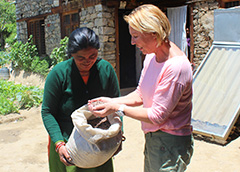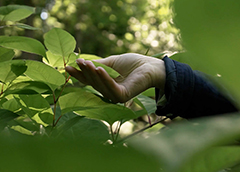For the past 60 years, environmental protection has been our top priority. We value dealing responsibly with limited natural resources and preserve the natural diversity of our environment.
Before we consider a new raw material for our products, we check the list of endangered plants. We are always on the lookout for new high tech methods of protecting nature and safeguarding sustainable cultivation. For example, we use plant stem cells to enable us to use entire plants and not only part of them.
We do not use any unacceptable ingredients such as silicones, mineral oils and microplastics. Whenever possible, we source our raw materials from certified organic farming or those gathered in the wild.
HOW WE WILL ACHIEVE THE GOAL
![]()
ORGANIC SURFACTANTS
Surfactants are used in detergents, care products and cleaning agents in particular because of their cleansing effect. They now have a bad reputation because they land in our wastewater and can only be partially filtered by treatment plants. The degradation products of surfactants can be toxic for fish, crabs and algae.
That is why we are collaborating with the Fraunhofer Institute and Federal Ministry for the Environment as part of a research project on developing organic surfactants. By 2025, we will replace conventional surfactants with organic surfactants.
![]()
SUSTAINABLE PALM OIL
Palm oil is controversial because both rainforests and peat soils are being destroyed or burnt down to create oil palm plantations. We have been active members of FONAP (The Forum for Sustainable Palm Oil) and the RSPO (Roundtable on Sustainable Palm Oil) for many years. The two organizations are committed to the environmentally and socially compatible production of palm oil. That means:
- Protecting biodiversity by not clearing forests
- Protecting the climate by not planting new oil palms on peat soils
- Respecting the rights of indigenous peoples, small farmers and laborers
By 2025, we will increase our use of sustainable palm oil derivatives from the current 70% to 100% (update: we have already reached 97% in late 2023).
![]()
ORGANIC SURFACTANTS
Surfactants are used in detergents, care products and cleaning agents in particular because of their cleansing effect. They now have a bad reputation because they land in our wastewater and can only be partially filtered by treatment plants. The degradation products of surfactants can be toxic for fish, crabs and algae.
That is why we are collaborating with the Fraunhofer Institute and Federal Ministry for the Environment as part of a research project on developing organic surfactants. By 2025, we will replace conventional surfactants with organic surfactants.
![]()
SUSTAINABLE PALM OIL
Palm oil is controversial because both rainforests and peat soils are being destroyed or burnt down to create oil palm plantations. We have been active members of FONAP (The Forum for Sustainable Palm Oil) and the RSPO (Roundtable on Sustainable Palm Oil) for many years. The two organizations are committed to the environmentally and socially compatible production of palm oil. That means:
- Protecting biodiversity by not clearing forests
- Protecting the climate by not planting new oil palms on peat soils
- Respecting the rights of indigenous peoples, small farmers and laborers
By 2025, we will increase our use of sustainable palm oil derivatives from the current 70 % to 100 %.

It is important to us that our daily activity contributes to protecting the environment. With our research project on organic surfactants and our social and ecological projects, we help to protecting nature and biodiversity.
Guylaine Le Loarer, Head of Research & Development and Sustainability Officer

It is important to us that our daily activity contributes to protecting the environment. With our research project on organic surfactants and our social and ecological projects, we help to protecting nature and biodiversity.
Guylaine Le Loarer, Head of Research & Development and Sustainability Officer









